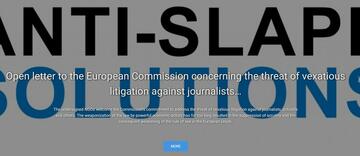
Dear Ms Lindholm,
The undersigned NGOs welcome the Commission’s commitment to address the threat of vexatious litigation against journalists, activists and others. The weaponization of the law by powerful economic actors has for too long resulted in the suppression of scrutiny and the consequent weakening of the rule of law in the European Union.
The incidence of Strategic Lawsuits Against Public Participation (SLAPP) is notable throughout the European Union. Shocking as the extent of documented suppression of public interest activity may be, we are acutely aware that we are only able to document the tip of the iceberg. Inequality of arms facilitates coercive activity which results in the removal of recorded scrutiny, and has a chilling effect on public interest activity going forward.
The present state of affairs is caused by the existence of criminal defamation law, abuse of civil lawsuits for libel or protection of one’s reputation, and by deficiencies in existing EU private international law, as well as the absence of harmonising measures which would ensure that fundamental rights are upheld in the Member States. We therefore propose a number of short to medium term measures with a view to creating an enabling environment for a vibrant democracy in the European Union.
Specifically, in order to (i) protect the rights of citizens, journalists, activists, academics, trade unionists, media organisations and NGOs, as well as (ii) their ability and obligation to supplement and enable enforcement of the law of the European Union, we are of the view that the following matters require urgent attention:
- In the first instance, and as a matter of urgency, the Brussels I Regulation (recast) requires amendment with a view to grounding jurisdiction in the domicile of the defendant in matters relating to defamation. This would remove the facility for pursuers to abuse their ability to choose a court or courts which have little connection to the dispute;
- The omission of defamation from the scope of the Rome II Regulation requires journalists to apply the lowest standard of press freedom available in the laws which might be applied to a potential dispute. We recommend the inclusion of a new rule which would require the application of the law of the place to which a publication is directed;
- Furthermore, a Directive should be adopted to introduce procedural safeguards with a view to limiting the availability of SLAPPs against journalists, activists and citizens. The absence of such measures constitutes a significant threat to the integrity of the internal market, as well as the proper functioning of the Union’s institutional order. Examples of good practice in the European Union and elsewhere should be considered in order to establish minimum standards throughout the Union.
- Finally, budgetary measures to morally and financially support all SLAPPs victims should be part of the available help.
The rationale and legal basis for the adoption of these measures is explained more fully in advice which Article 19, Committee to Protect Journalists (CPJ), European Centre for Press and Media Freedom (ECPMF), Reporters Without Borders (RSF), and PEN International commissioned from the Centre for Private International Law at the University of Aberdeen.
Here the advice for ease of reference.
We look forward to your response.
Yours truly,
Article 19
Articolo 21
Association of European Journalists (AEJ)
Cartoonists Rights Network International (CRNI)
Committee to Protect Journalists (CPJ)
Danish PEN
Daphne Caruana Galizia Foundation
English PEN
European Centre for Press and Media Freedom (ECPMF)
European Federation of Journalists (EFJ)
Free Press Unlimited (FPU)
German PEN
Global Forum for Media Development (GFMD)
Greenpeace EU Unit
IFEX
Index on Censorship
International Press Institute (IPI)
Legal Human Academy
Norwegian PEN
Osservatorio Balcani e Caucaso Transeuropa (OBCT)
PEN International
Reporters Without Borders (RSF)
Scottish PEN
South East Europe Media Organisation (SEEMO)
Swedish PEN
Transparency International EU
Tags: SLAPP Media freedom
This content is part of the Media Freedom Rapid Response (MFRR), a Europe-wide mechanism which tracks, monitors and responds to violations of press and media freedom in EU Member States and Candidate Countries. The project is co-funded by the European Commission.


